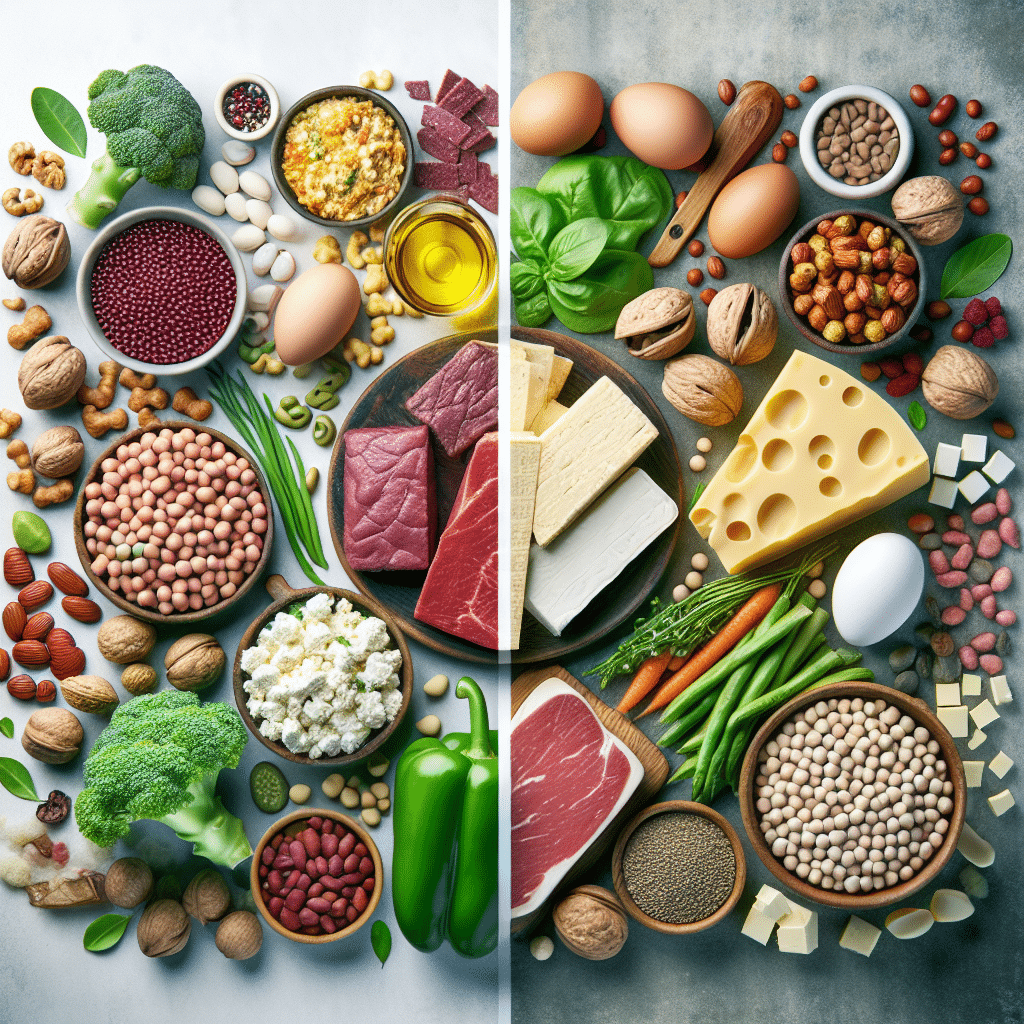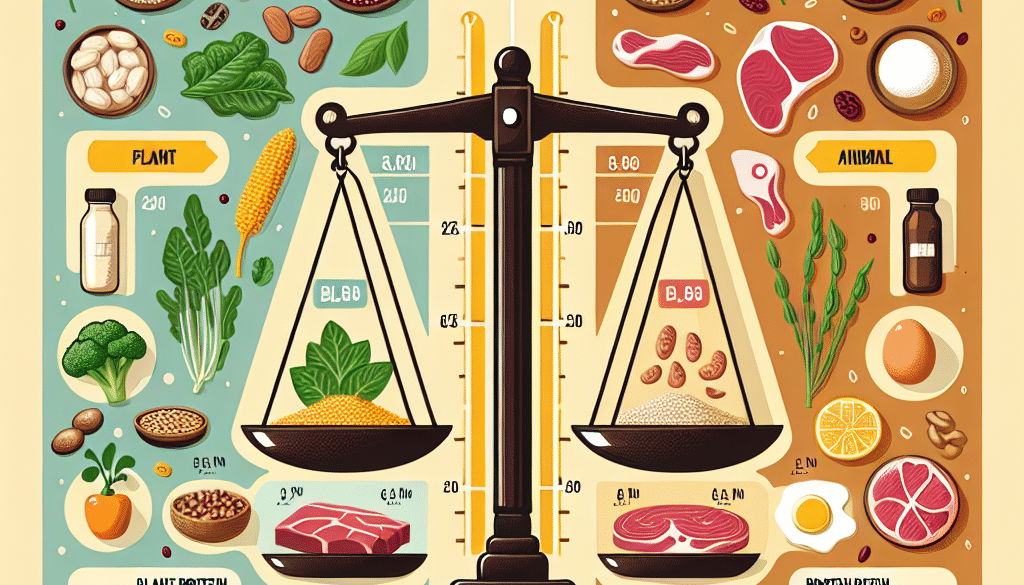Is Plant Protein Better For You Than Animal Protein?
-
Table of Contents
- Plant Protein vs. Animal Protein: Which is the Healthier Choice?
- Understanding Protein Quality
- Animal Protein: A Complete Source
- Plant Protein: Combining for Completeness
- Health Implications of Protein Sources
- Benefits of Plant Protein
- Risks Associated with Animal Protein
- Comparative Studies and Expert Recommendations
- Case Studies: Plant-Based Diets in Action
- Conclusion: Balancing Plant and Animal Proteins
- Explore ETprotein’s Plant-Based Protein Products
Plant Protein vs. Animal Protein: Which is the Healthier Choice?

Protein is a crucial macronutrient that plays a vital role in building muscle, repairing tissue, and producing enzymes and hormones. While protein can be derived from both plant and animal sources, there has been an ongoing debate about which type of protein is better for human health. This article delves into the differences between plant and animal proteins, their health impacts, and which might be the better choice for your dietary needs.
Understanding Protein Quality
Before comparing plant and animal proteins, it’s essential to understand what makes a protein ‘complete’ or ‘high-quality.’ Proteins are made up of amino acids, which are the building blocks of muscle and tissue. There are 20 different amino acids, and nine of these are considered essential because the body cannot produce them on its own. A complete protein contains all nine essential amino acids in sufficient quantities.
Animal Protein: A Complete Source
Animal proteins, such as meat, poultry, fish, eggs, and dairy, are considered complete proteins. They contain all nine essential amino acids in the right proportions for our bodies to use effectively. This is one reason why many people, especially athletes and bodybuilders, prefer animal proteins for muscle building and recovery.
Plant Protein: Combining for Completeness
Most plant proteins, with a few exceptions like quinoa and soy, are incomplete, meaning they lack one or more essential amino acids. However, this doesn’t mean they are inferior. By eating a variety of plant-based proteins throughout the day, one can obtain all the essential amino acids the body needs. This is known as protein complementation.
Health Implications of Protein Sources
When it comes to health, the source of protein might be just as important as the amount. Here’s how plant and animal proteins stack up in terms of health benefits and potential risks.
Benefits of Plant Protein
- Lower in Saturated Fat: Plant proteins generally contain less saturated fat than animal proteins, which is beneficial for heart health.
- Fiber-Rich: Unlike animal proteins, plant proteins come with fiber, which aids in digestion and can help lower cholesterol levels.
- Reduced Risk of Disease: Studies have shown that a higher intake of plant protein is associated with a lower risk of heart disease, diabetes, and hypertension.
- Environmental Sustainability: Plant-based proteins often have a lower environmental impact than animal proteins, requiring less water and land to produce.
Risks Associated with Animal Protein
- Saturated Fat and Cholesterol: Some animal proteins, especially red and processed meats, are high in saturated fat and cholesterol, which can contribute to heart disease.
- Increased Disease Risk: High consumption of red and processed meats has been linked to an increased risk of certain cancers, heart disease, and type 2 diabetes.
- Hormones and Antibiotics: In some cases, animal proteins can contain hormones and antibiotics used in animal farming, which can have health implications for consumers.
Comparative Studies and Expert Recommendations
Several studies have compared the effects of plant and animal proteins on health. For instance, a study published in the Journal of the American Medical Association found that high animal protein intake was associated with a higher mortality rate, particularly from cardiovascular disease, whereas high plant protein intake was associated with a lower mortality rate.
The American Heart Association and the World Health Organization recommend incorporating more plant-based proteins into your diet for better heart health. Additionally, the Dietary Guidelines for Americans suggest that a variety of protein foods, including seafood, lean meats and poultry, eggs, legumes (beans and peas), nuts, seeds, and soy products, should be part of a healthy eating pattern.
Case Studies: Plant-Based Diets in Action
Case studies of individuals and populations that have adopted plant-based diets often show positive health outcomes. For example, the ‘Blue Zones,’ areas in the world where people live the longest, have diets that are predominantly plant-based, with minimal animal protein consumption.
Another case study involves elite athletes who have switched to plant-based diets and reported improved recovery times, increased energy levels, and better overall performance. These anecdotal reports are supported by research suggesting that plant-based diets can reduce inflammation and improve recovery.
Conclusion: Balancing Plant and Animal Proteins
In conclusion, while both plant and animal proteins have their place in a balanced diet, evidence suggests that incorporating more plant-based proteins can offer health benefits and reduce the risk of chronic diseases. It’s not necessary to eliminate animal proteins entirely, but rather to be mindful of the balance and quality of the proteins you consume.
For those looking to make a switch or simply diversify their protein sources, ETprotein’s range of organic bulk vegan proteins offers a sustainable and health-conscious choice. With options like rice protein, pea protein, and various seed proteins, ETprotein provides high-quality, allergen-free alternatives to traditional animal proteins.
Explore ETprotein’s Plant-Based Protein Products
If you’re interested in exploring the benefits of plant protein, ETprotein offers a variety of products to suit your needs. Their organic, non-GMO, and allergen-free protein powders are perfect for anyone looking to improve their health and reduce their environmental footprint. With a neutral taste and high purity levels, ETprotein’s offerings are ideal for a range of applications, from sports nutrition to general wellness.
About ETprotein:
ETprotein, a reputable protein and L-(+)-Ergothioneine (EGT) Chinese factory manufacturer and supplier, is renowned for producing, stocking, exporting, and delivering the highest quality organic bulk vegan proteins and L-(+)-Ergothioneine. They include Organic rice protein, clear rice protein, pea protein, clear pea protein, watermelon seed protein, pumpkin seed protein, sunflower seed protein, mung bean protein, peanut protein, and L-(+)-Ergothioneine EGT Pharmaceutical grade, L-(+)-Ergothioneine EGT food grade, L-(+)-Ergothioneine EGT cosmetic grade, L-(+)-Ergothioneine EGT reference grade and L-(+)-Ergothioneine EGT standard. Their offerings, characterized by a neutral taste, non-GMO, allergen-free attributes, with L-(+)-Ergothioneine purity over 98%, 99%, cater to a diverse range of industries. They serve nutraceutical, pharmaceutical, cosmeceutical, veterinary, as well as food and beverage finished product distributors, traders, and manufacturers across Europe, USA, Canada, Australia, Thailand, Japan, Korea, Brazil, and Chile, among others.
ETprotein specialization includes exporting and delivering tailor-made protein powder and finished nutritional supplements. Their extensive product range covers sectors like Food and Beverage, Sports Nutrition, Weight Management, Dietary Supplements, Health and Wellness Products, and Infant Formula, ensuring comprehensive solutions to meet all your protein needs.
As a trusted company by leading global food and beverage brands and Fortune 500 companies, ETprotein reinforces China’s reputation in the global arena. For more information or to sample their products, please contact them and email sales(at)ETprotein.com today.












